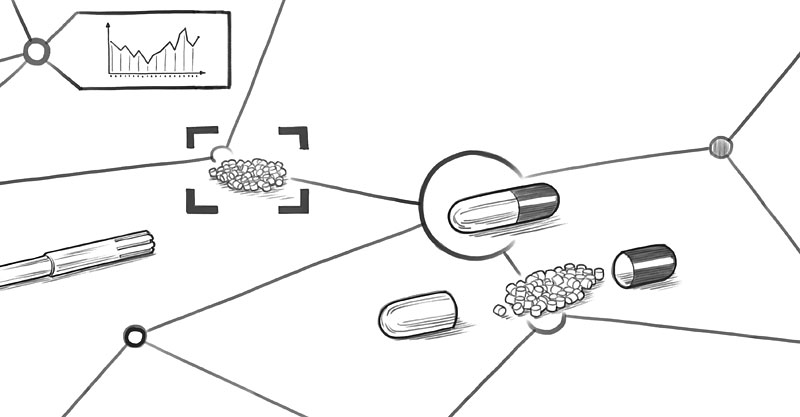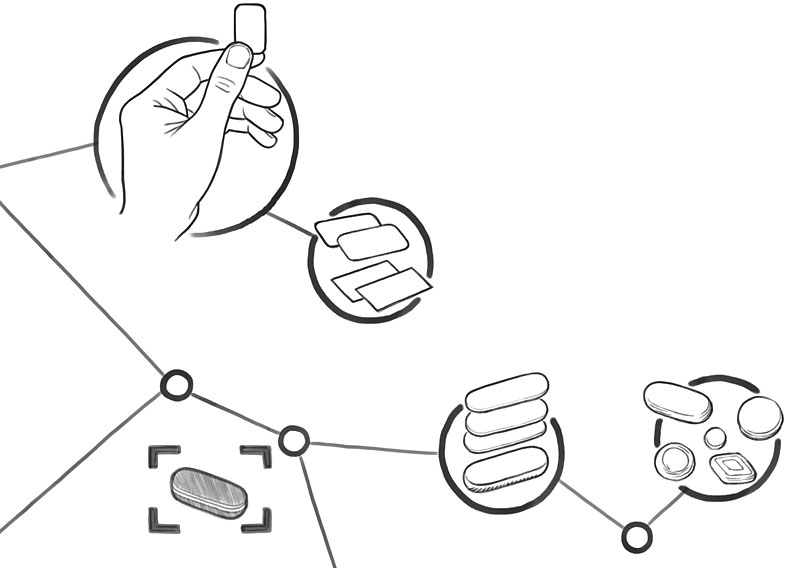Every human is unique – but medical treatments are often not. Body weight, gender and genetics are just some of the factors that can influence therapies. An example of the common “one size fits all” approach: drugs that are administered as tablets are usually only available in fixed dosages. This does not allow for individual dosing; instead, many patients use imprecise measures like the manual splitting of tablets in halves or quarters.
“But the treatment depends on every milligram of active ingredient,” explains Peter Brun, pharmacist and team leader in the Pharma Services division at Harro Höfliger. “Personalized medicine, in which, for example, the amount of active ingredient is precisely matched to the needs of the individual patient, would in many cases increase treatment success and minimize side effects.” The potential of such medical precision for both patients and the healthcare system is huge; in Germany alone, incorrect medication is said to lead to tens of thousands of deaths every year.
“The treatment depends on every milligram of active ingredient.“ Peter Brun, pharmacist and team leader in the Pharma Services division at Harro Höfliger
In addition to increased safety and improved treatment success, personalized medicine makes it possible to combine different drugs in one administration form. For example, many people have to take numerous capsules or tablets throughout the day. In the future, it might be sufficient to take just one individually tailored combination product once a day, which may help to improve patients‘ quality of life.
(Illustration: Bernd Schifferdecker)
A market with a promising future
Thomas Weller, CEO at Harro Höfliger, is sure that these advantages will increase the importance of personalized medicine in the coming years. “One of our principles is to think ahead. For this reason, we observe the trends in the field of personalized medicine very closely so that we are at the forefront right from the start and are able to advance these technological developments. To this end, we also draw on a network of specialized partner companies. Our US-based partner Experic, for example, offers the possibility of manufacturing product samples in small batches. This is a major advantage in the development of personalized drugs.”
Innovative solutions
DS Technology, a company specializing in medical and pharmaceutical devices, also belongs to Harro Höfliger‘s network in the field of personalized medicine. Peter Brun reports about the cooperation: “We supply the entire machine technology for the production of the XStraw®. This is a device where the active ingredient is administered with a straw – ideal for children or patients with swallowing difficulties. With our machines, the XStraw® can be filled with the exact dose of the required drug, by an individual dosing of the micro-tablets or pellets which are containing the active ingredient. This method can also be used to combine different drugs.”
Also in the capsule area, personalized medicine in the form of micro-tablets is very promising. “Exact dosing of various filling media into capsules is one of our specialties,” says Marco Laackmann, Director Inhalation Technology at Harro Höfliger. “Our technology enables the exact dosage of micro-tablets into hard capsules. This not only enables us to precisely adjust the active ingredient in small, patient-specific steps – different dosing stations also make it possible to administer any number of different drugs with just one capsule.”
(Illustration: Bernd Schifferdecker)
Printed medicine
DiHeSys (Digital Health Systems), with headquarters in Ulm, also pursues the vision of a treatment that is precisely adapted to the individual patient. However, instead of dosing technology, the company focuses on medication printing. “With the help of 2D printing, we produce personalized thin films, where we apply an exact amount of one or several active ingredients to a carrier material,” explains Dr. Markus Dachtler, CEO at DiHeSys. “For the individualized printing of tablets – also with several layers for different active ingredients – we use GMP-compliant 3D printers.”
DiHeSys chose Harro Höfliger as a partner for the manufacture of these pharmaceutical printers: “Thanks to this cooperation, our customers receive printers, cartridges and the digital infrastructure for an optimized treatment from a single source. Personalized medicine – based on a patient’s personal data such as weight, height and lifestyle habits – could soon be prescribed by physicians, and directly printed in the pharmacy.”
Dr. Markus Dachtler, CEO at DiHeSys
“Thanks to this cooperation, our customers receive printers, cartridges and the digital infrastructure for an optimized treatment from a single source.“Dr. Markus Dachtler, CEO at DiHeSys
Individual by tradition
Thomas Weller is convinced that Harro Höfliger with its strong network, innovative engineering and corporate philosophy is well prepared for further developments in the field of personalized medicine. “One of our major advantages is a broad range of core technologies, for example for dosing, assembly and web processing applications, which we combine and tailor to each individual product. Focusing on individual needs is therefore a tradition at Harro Höfliger – and in my opinion, this provides us with the best prerequisites for contributing to the success story of individualized medicine.”
Download this article as PDF file
Image: DiHeSys, Illustration: Bernd Schifferdecker



